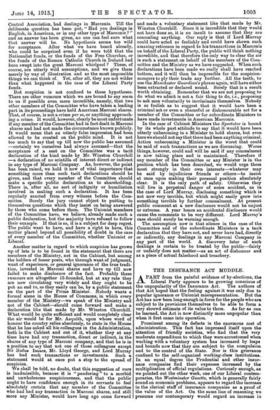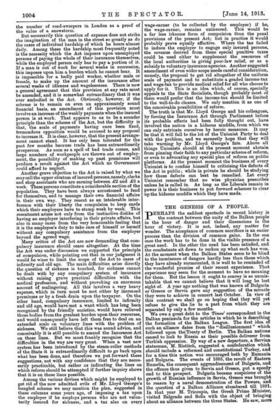THE INSURANCE ACT MUDDLE. A PART from the painful evidence of
by-elections, the Liberal Party appears to be growing conscious of the unpopularity of the Insurance Act. The authors of that Act hoped that the feeling against it was only due to popular ignorance or Unionist misrepresentation. But the Act has now been long enough in force for the people who are subject to its provisions themselves to be able to form a very shrewd estimate of its value to them. As far as can be learned, the Act is now distinctly more unpopular than when it first came into operation.
Prominent among its defects is the enormous cost of administration. This fact has impressed itself upon the attention of friendly societies, who find that the very moderate expenditure to which they were accustomed when working with a voluntary system has increased by leaps and bounds now that they are subject to the compulsion and to the control of the State. Nor is this grievance confined to the self-organized working-class institutions. In an equal degree the Prudential and other insur- ance companies find their expenses increased by the multiplication of official regulations. Curiously enough, as we pointed out the other week, one of our Liberal contem- poraries, the Westminster Gazette, which is generally fairly sound on economic problems, appears to regard the increase in the clerical staff of insurance companies as a proof of the value of the Act. On the same line of reasoning we presume our contemporary would regard an increase in the number of road-sweepers in London as a proof of the value of a snowstorm.
But necessarily this question of expense does not strike the imagination of the man in the street so greatly as do the cases of individual hardship of which he hears almost daily. Among these the hardship most frequently noted is the necessity which the Act imposes upon unemployed persons of paying the whole of their insurance themselves, while the employed person only has to pay a portion of it. If a man is out of work for several weeks in succession, this imposes upon him a burden which he cannot bear. It is impossible for a badly paid worker, whether male or female, to make up the amount of the insurance after several weeks of idleness and wagelessness. There is now a general agreement that this provision at any rate must be amended, and it is somewhat extraordinary that it was ever embodied in the Act. Obviously, however, if the scheme is to remain on even an approximately sound financial basis, an amendment of this provision must involve an increase of the weekly payments when the insured person is at work. That appears to us to be a sounder principle than the scheme of the Act, but the difficulty is that, the scale of payments having once been fixed, tremendous opposition would be aroused to any proposal to increase it. It is clear, however, that the present arrange- ment cannot stand. It has only been tolerated for the past few months because trade has been extraordinarily prosperous. As soon as a spell of bad trade comes, and large numbers of workpeople are thrown out of employ- ment, the possibility of making up past premiums will produce a revolt against the Act which no Government 2ould afford to neglect.
Another grave objection to the Act is raised by what we niay call the upper stratum of insured persons,namely, clerks and shop assistants who are earning between £2 and £3 a week. These persons constitute a considerable section of the population. They have been always accustomed to fend for themselves, and to manage their own financial affairs in their own way. They resent as an intolerable inter- ference with their liberty the compulsion to keep cards which their employers have to stamp week by week. This resentment arises not only from the instinctive dislike of having an employer interfering in their private affairs, but also in many cases from the very honourable feeling that it is the employee's duty to take care of himself or herself without any compulsory assistance from the employer beyond the agreed wage.
Many critics of the Act are now demanding that com- pulsory insurance should cease altogether. At the time the Act was under discussion we supported the principle of compulsion, while pointing out that in our judgment it would be wiser to limit the scope of the Act to cases of infirmity and old age. The main difficulties arise directly the question of sickness is touched, for sickness cannot be dealt with by any compulsory system of insurance -without raising grave practical difficulties with the medical profession, and without provoking an enormous amount of malingering. All this involves a very heavy expense, which in turn must be met either by increased premiums or by a fresh drain upon the taxpayer. On the other hand, compulsory insurance, limited to infirmity and old age, would have met a want which has long been recognized by the friendly societies, would have relieved those bodies from the greatest burden upon their resources, and would consequently have left them free to deal on an extended scale on voluntary lines with the problem of sickness. We still believe that this was sound advice, and conceivably it is still possible to amend the Insurance Act on these lines. But we must frankly recognize that the difficulties in the way are very great. When a vast new system has been introduced by the steam-roller methods of the State it is extraordinarily difficult to go back upon what has been done, and therefore we put forward these suggestions, not with any confidence that they are neces- sarily practicable, but rather as indicating the lines on which reform should be attempted if further inquiry shows that it is on these lines possible.
Among the various devices which might be employed to get rid of the now admitted evils of Mr. Lloyd George's bungled scheme we may mention the plan, suggested in these columns some years ago, of imposing a tax upon the employer if he employs persons who are not volun- tarily insured for sickness, and a tax also on every wage-earner (to be collected by the employer) if he, the wage-earner, remains uninsured. This would be a far less irksome form of compulsion than the penal provisions of the present Act; but in practice it would probably prove equally effective. Where the tax failed to induce the employer to engage only insured persons, the revenue derived from these special punitive taxes could be used either to supplement the resources of the local authorities in giving poor-law relief, or as a subsidy to voluntary insurance agencies. Another suggested amendment of even wider scope needs careful consideration, namely, the proposal to get rid altogether of the uniform scale of payment and to substitute a graded income-tax and wage-tax to provide medical relief for all who choose to apply for it. This is an idea which, of course, specially appeals to the State Socialists, though probably most of them would prefer that the income-tax should be limited to the well-to-do classes. We only mention it as one of the conceivable possibilities of reform.
The truth is that Mr. Lloyd George and his colleagues, by forcing the Insurance Act through Parliament before its probable effects had been fully thought out, have involved the nation in a hideous muddle, from which we can only extricate ourselves by heroic measures. It may be that it will fall to the lot of the Unionist Party to deal with the problem, and we earnestly hope that they will take warning by Mr. Lloyd George's fate. Above all things Unionists should at the present moment abstain from pinning their faith to any particular scheme of reform, or even to advocating any special plan of reform on public platforms. At the present moment the business of every Unionist is to confine himself to criticising the defects of the Act in public ; while in private he should be studying how those defects can best be remedied. Let every Unionist remember that no wise physician prescribes unless he is called in. As long as the Liberals remain in power it is their business to put forward schemes to clear up the hideous muddle which they have made.















































 Previous page
Previous page